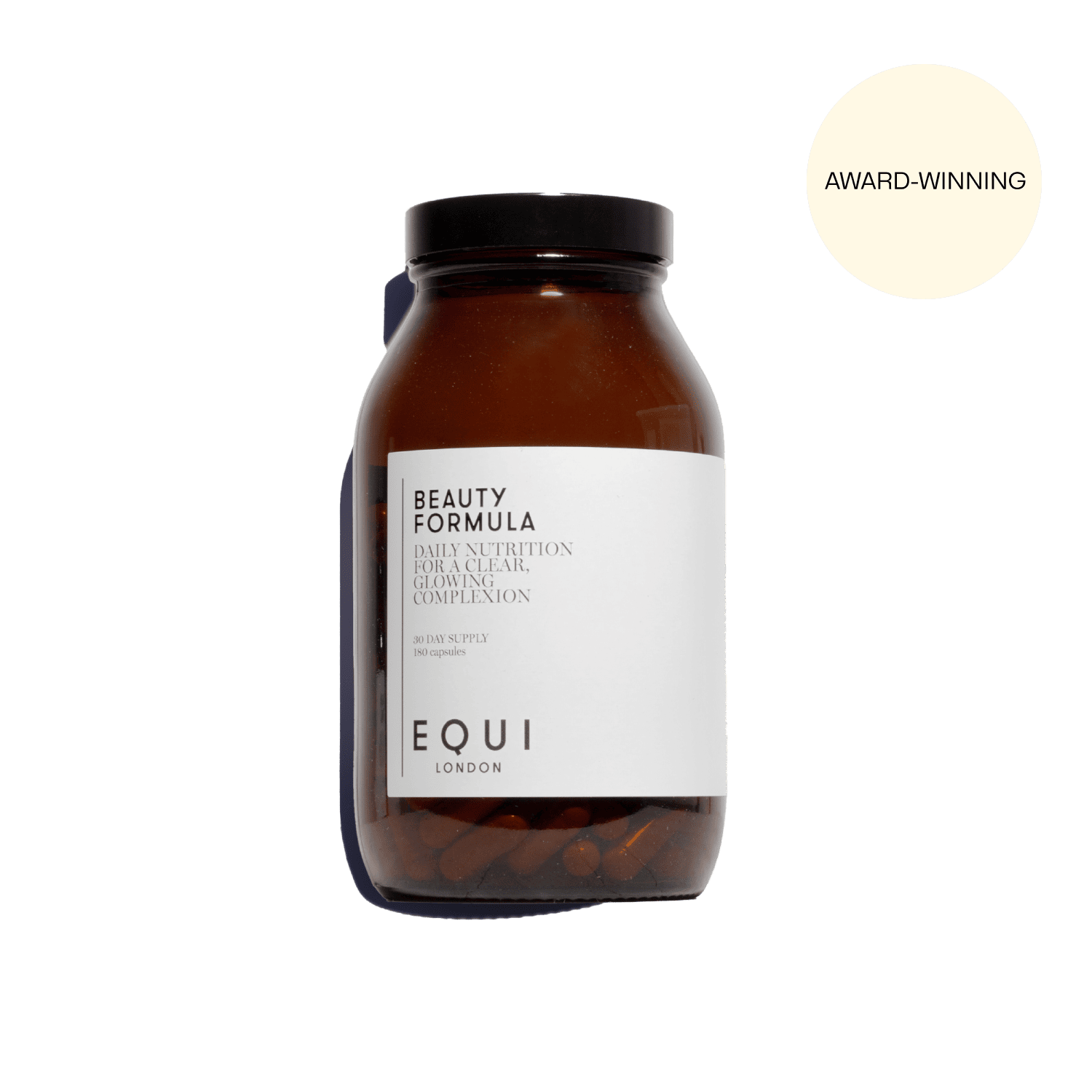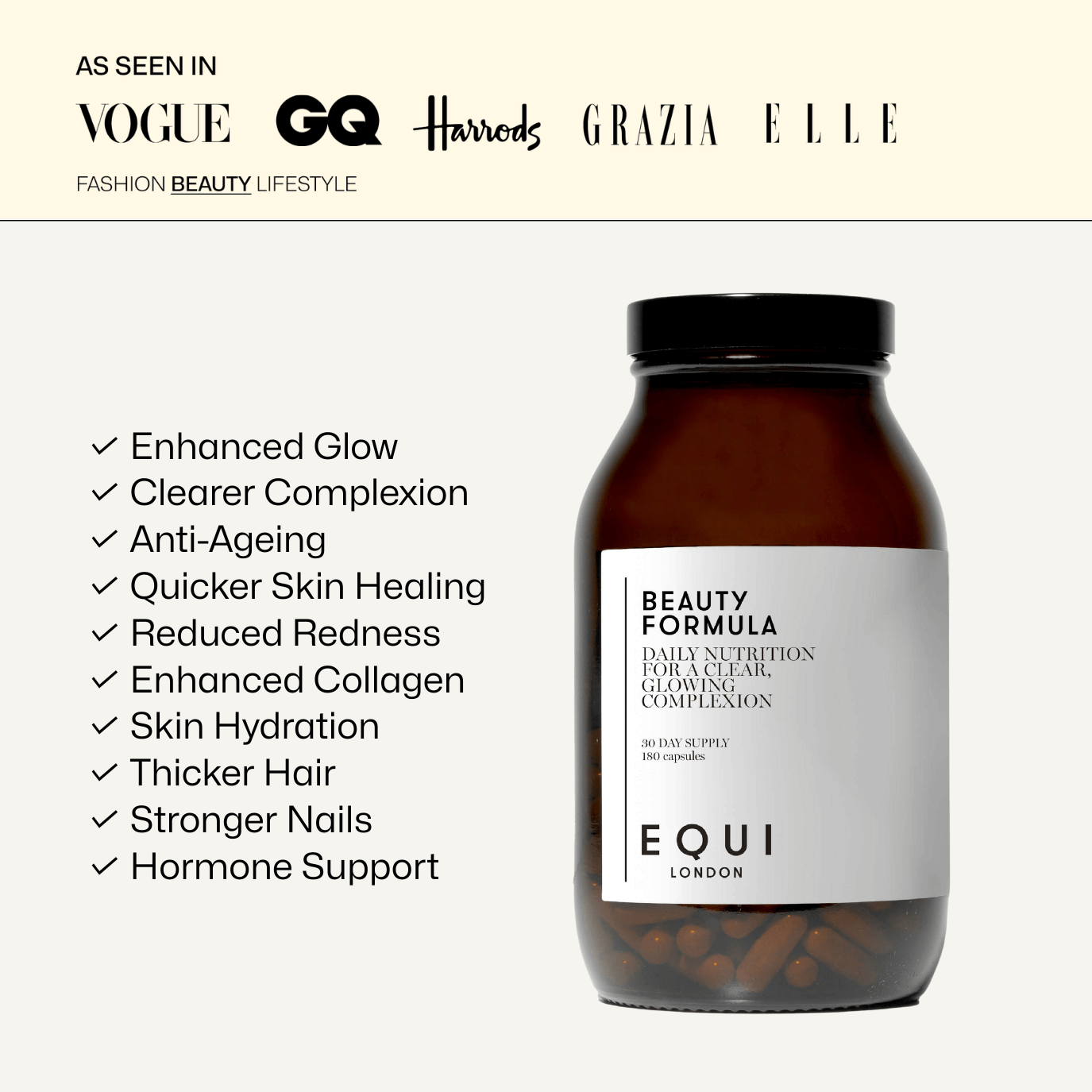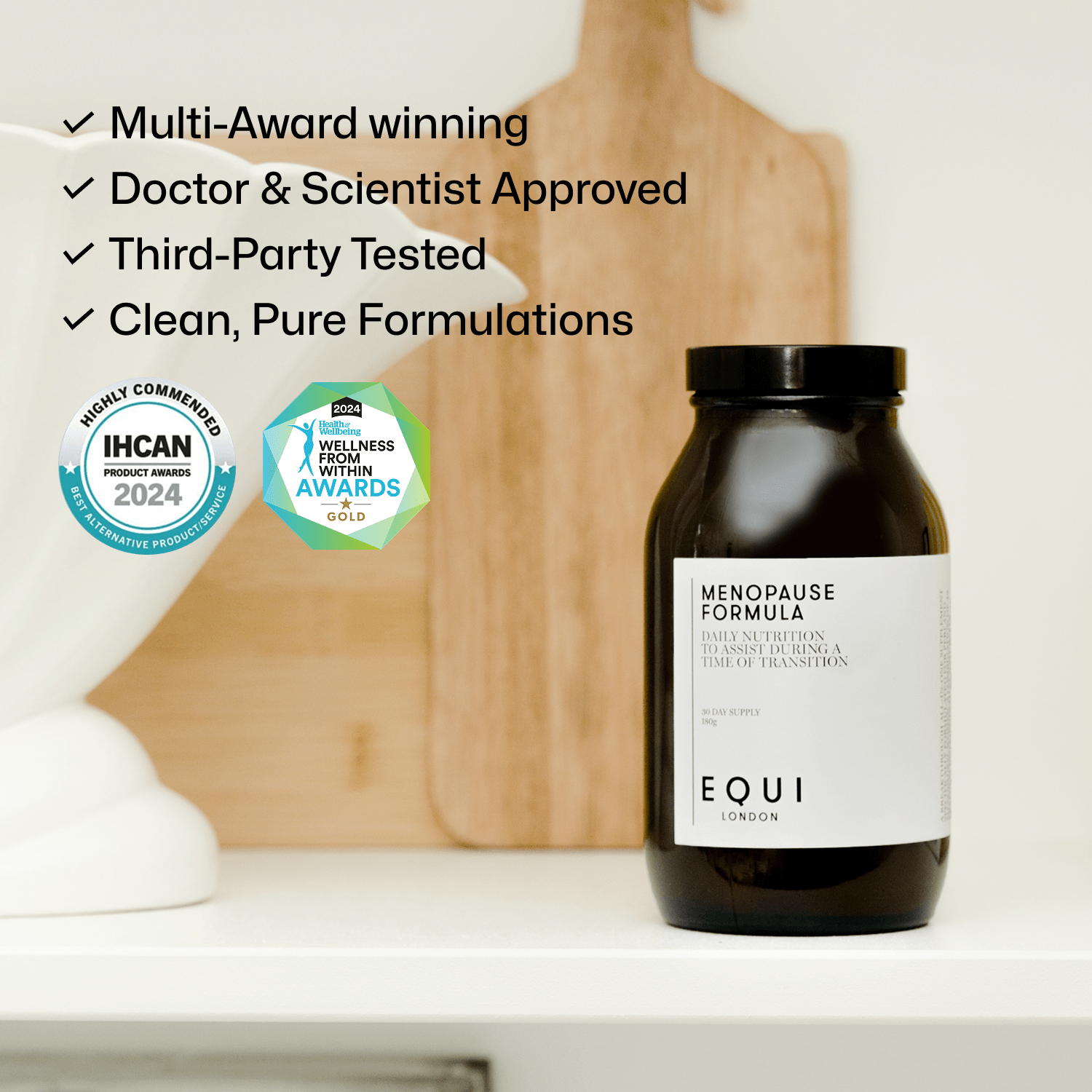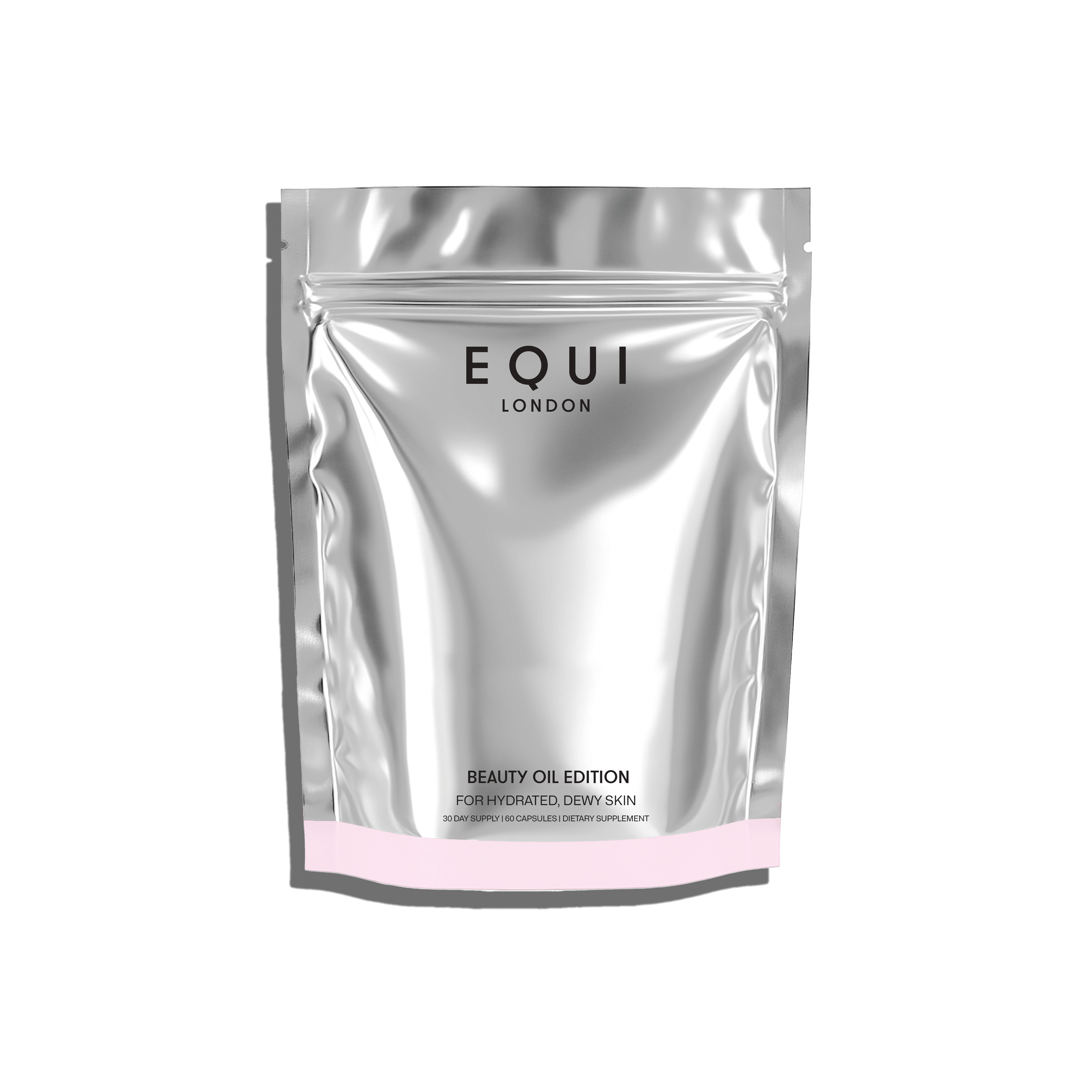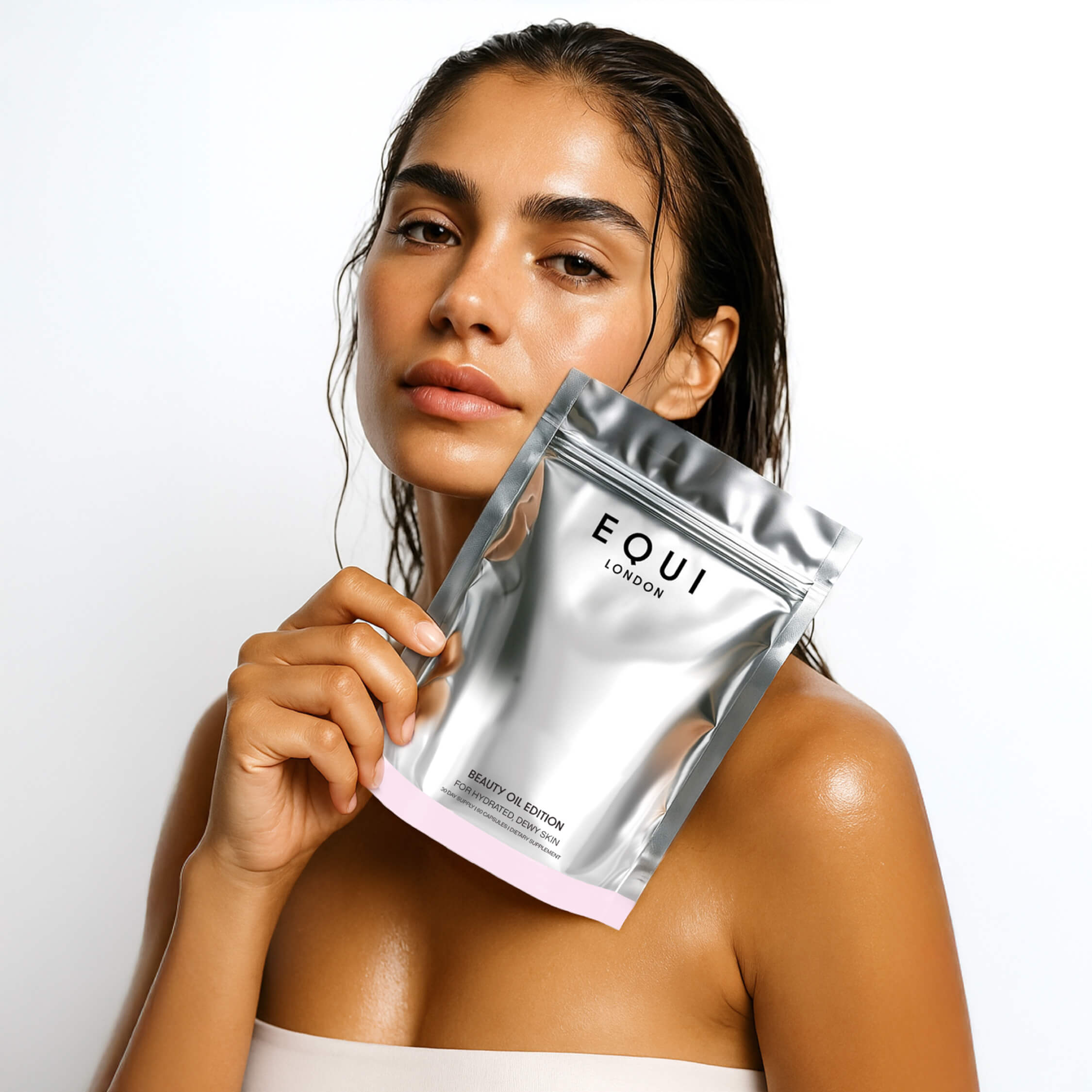Want to get your skin summer ready? All you need is our Summer Skin Series, where we provide you with all the hints, tips, and tricks to get your skin summer ready! Glowy, dewy skin is on everyone’s wish list come summertime. Today, we say goodbye to dull, lacklustre skin, with our favourite glow giving foods, products, and tricks to help you go make-up free.
Dull Skin is Thirsty Skin!
The first and most important factor in achieving glowing skin is hydration! Hydration is essential for the overall health of the body, and it plays a vital role in maintaining healthy skin. Consumption of water helps to keep the skin hydrated, which makes the skin appear radiant and glowing. One study reported that increased water intake could enhance the elasticity and smoothness of the skin (1), helping to achieve a glow. Furthermore, research has found that it improves the skin's barrier function, which helps to prevent water loss from the skin (2). This leads to better hydration and helps to keep the skin looking healthy and radiant. Dehydration, on the other hand, can cause the skin to become dry and dull. When the skin is dehydrated, it loses its plumpness and elasticity, and its natural glow can be diminished. This can also lead to the premature development of wrinkles and age spots – head to our recent blog to read more. It is essential to drink at least 8-10 glasses of water per day (at least 2 litres) to keep your skin hydrated from the inside out, to help keep skin healthy and glowing.
Hyaluronic Acid
One of our hero nutrients found in Beauty Formula, hyaluronic acid is worth a mention again due to its ability to promote skin hydration and elasticity, resulting in a glowing complexion. Hyaluronic acid works by binding to water molecules, which facilitates the retention of moisture in the skin. This, in turn, plumps up the skin cells and smoothens out fine lines and wrinkles. The enhanced hydration and elasticity of the skin give it a radiant, dewy appearance. Furthermore, a study revealed that topical application of hyaluronic acid can significantly improve skin texture, firmness, and hydration levels. Results showed increased skin hydration levels, leading to a more radiant and glowing complexion (3). Another study found that hyaluronic acid injections can improve skin radiance as well. Results showed a significant improvement in skin texture, hydration levels, and overall radiance of the skin (4). Great results have also been proven with consuming sources of hyaluronic acid as well – read our latest blog for everything you need to know about this star nutrient. In conclusion, the use of hyaluronic acid in skincare products as well as its consumption can indeed help improve skin radiance and promote a glowing complexion. Its ability to retain moisture and enhance skin elasticity is supported by scientific studies, making it a reliable and effective ingredient in achieving healthy, beautiful, glowing skin.
Healthy Fats Support a Natural Glow
Consuming healthy fats has been shown to contribute positively to skin health, resulting in a natural glow. Omega-3 fatty acids, for example, are essential components of skin cell membranes, which help to hydrate the skin and improve its overall appearance. A study revealed that a healthy omega-3 to omega-6 ratio can help reduce inflammation and improve skin health (5), giving it a natural glow. Monounsaturated fats, such as those found in olive oil, avocado, and nuts, are also beneficial for skin health. They help to maintain the skin's elasticity, helping it to stay looking radiant. Finally, polyunsaturated fats, such as those found in fatty fish, also play a role in skin health. One study found that consuming polyunsaturated fats was associated with a reduced risk of dry and dull skin (6). Incorporating these healthy fats into our diets can result in clear, healthy, and glowing skin. Studies have proven the benefits of healthy fats including omega-3, monounsaturated, and polyunsaturated fats for the skin. By prioritising a healthy diet and incorporating a variety of healthy fats, we can improve our overall skin health.
Antioxidants
Antioxidants are compounds that protect cells from damage caused by free radicals, which can harm skin cells and cause dull, lacklustre skin. Consuming and applying antioxidants topically can help neutralise these free radicals and may provide various skin benefits, including a brighter and more radiant complexion. One study found that women who consumed a supplement containing antioxidants and other nutrients for 12 weeks exhibited improvements in skin elasticity, hydration, and brightness compared to those who did not take anything (7). One of the most well-known antioxidants for skin health is vitamin C, which is vital for collagen production, a protein that gives skin its elasticity and firmness. A study showed that topical application of vitamin C improved skin texture, decreased fine lines and wrinkles, and improved skin brightness (8). Another antioxidant, vitamin E, has been shown to protect skin cells from oxidative damage and improve skin tone and texture. A study found that combining vitamin C and vitamin E in a topical formulation produced significant improvements in skin hydration and moisture levels (9). Studies have also highlighted that consuming antioxidants can help protect skin cells from damage and promote a more youthful and glowing appearance. Vitamin C and E can improve skin hydration, brightness, and elasticity. Good dietary sources of vitamin C include berries, citrus fruits, tomatoes, and peppers, whilst vitamin E can be obtained from almonds, peanuts, sunflower seeds and green leafy veg such as spinach.
Beauty Formula contains a blend of 48 of the most effective nutritional compounds proven to combat skin concerns, support collagen and hydration levels and strengthen hair and nails. This award-winning powdered formula provides total body support from hormones to digestion, addressing the underlying causes of problem skin, whilst supplementing your body with everything it needs to glow.
GlowCutis®
GlowCutis® is at the core of Beauty Formula and was designed to help you get a natural looking glow. It does this thanks to some key glow-giving nutrients including hyaluronic acid, type 1 marine collagen peptides, zinc, vitamin C, pine bark Extract, resveratrol & silica, which work together to support every stage of the skin cell cycle. It’s a collagen-stimulating, antioxidant powerhouse to nourish skin, from the inside out, to help you achieve glowing skin!
Include AHA’s in Your Skincare Routine
Lactic acid is an alpha hydroxy acid (AHA) that has been shown to help skin glow and appear more radiant. One study found that lactic acid helps improve the texture and tone of skin by increasing the production of collagen, which can lead to smoother and more youthful-looking skin (10). Lactic acid has exfoliating effects on the skin, helping to remove dead cells and impurities that can dull the complexion. This can also help to unclog pores and reduce the appearance of blemishes and hyperpigmentation. Lactic acid has been found to have moisturising effects on the skin too, helping to improve hydration levels and prevent dryness and flakiness (11). This can lead to a more plump and dewy-looking complexion, which can further enhance the skin's overall radiance. Another AHA to consider in your skincare routine are fruit acids, which are naturally occurring organic acids found in fruits such as citrus, apples, and grapes. They help exfoliate and rejuvenate the skin, resulting in a brighter and smoother complexion. One of the main ways that fruit acids help the skin to glow is by exfoliating the top layer of dead skin cells, revealing fresher, more radiant skin beneath. Fruit acids work by breaking down the bonds between dead skin cells, allowing them to be easily removed from the surface of the skin. This process also helps to unclog pores and improves the texture of the skin. Several scientific studies have investigated the effectiveness of fruit acids in improving the appearance of the skin. One study found that the use of a skincare product containing 10% glycolic acid (an AHA derived from sugar cane) significantly increased skin hydration and improved the overall appearance of aged skin after just 12 weeks of use (12). Overall, AHA’s such as lactic and fruit acids are a powerful tool in skincare, helping to exfoliate, rejuvenate, and brighten the skin. When used in the appropriate concentration and formulation, they can help improve the texture, tone, and hydration of the skin, leading to a more glowing and radiant complexion.
Exercise
Apart from diet and skincare, certain lifestyle habits can help too. For example, exercise can increase oxygen and nutrient supply to the skin, reduce inflammation, and promote collagen production, all of which help to promote a glowing complexion. Exercise promotes blood flow, which can lead to a glowing appearance. According to research, regular exercise increases blood flow to the skin, providing important nutrients and oxygen to the skin cells (13). Another study found that regular physical activity also stimulates the growth of new blood vessels, allowing for a more efficient circulation (14). Finally, regular exercise regulates the production of collagen, which is essential for skin firmness, elasticity, which both help the skin to look fresh and glow. Studies have found that exercise can prevent the loss of collagen and increase its production, leading to a more youthful appearance (15). So, regular exercise will not only keep you fit, but will also help you achieve healthy and glowing skin! With exercise, it’s important to choose something that you enjoy but forms of cardio that really get your blood pumping have proven benefits including boxing, running, circuits, and spinning.
References
-
Guelinckx, I., et al. (2015) “Contribution of water intake to skin hydration and the role of caffeine”, European Journal of Clinical Nutrition, vol. 69, no. 10, pp. 1207-1213.
-
Stefaniak, A., et al. (2010) “Effect of water intake on skin physiology: distinct differences between drinking-water and flavored-water”, International Journal of Cosmetic Science, vol. 32, no. 5, pp. 366-367.
-
Asai, M., Yoshimura, K., & Takahashi, A. (2018). A potential role of hyaluronic acid in retarding skin photoaging. Journal of Cosmetic Dermatology, 17(3), 273-279.
-
Chiang, T. R., & Yang, K. C. (2017). Evaluation of the effect of intraoral administration of hyaluronic acid on the moisture and radiance in facial skin. Journal of Drugs in Dermatology, 16(10), pp. 985-990.
-
Rhodes, L. E., & Belgi, G. (2013). Omega-3 fatty acids and skin health. Journal of lipid research, 54(8), pp. 2259-2262.
-
Cho E, Chen WY, Hunter DJ, Stampfer MJ, Colditz GA, Hankinson SE. (2002). Dietary fat intake and risk of dry skin: a prospective study. Am J Clin Nutr. 76(1), pp. 94-9.
-
Pullar J, et al. (2017). The Role of Vitamin C in Skin Health. Nutrients. 9(8), pp. 866.
-
Telang PS. (2013). Vitamin C in dermatology. Indian Dermatol Online Journal. 4(2), pp. 143-146.
-
Murray JC, Burch JA, Streilein RD, Iannacchione MA, Hall RP, Pinnell SR. (2008). A topical antioxidant solution containing vitamins C and E stabilized by ferulic acid provides protection for human skin against damage caused by ultraviolet radiation. J Am Acad Dermatol. 59(3), pp. 418-425.
-
Kim, H.S. et al. (2015). Effects of lactic acid on skin texture and the synthesis of dermal collagen in hairless mice. Biomolecules & Therapeutics, 23(4), pp. 374-380.
-
Draelos, Z.D. et al. (2010). The effect of lactate lotion on the maintenance of stratum corneum integrity. Journal of Cosmetic Dermatology, 9(1), pp. 56-60.
-
Saurat, J. H., Zane, C., De, C. J., Poli, F., Ochando, N., & Ballaré, M. (2004). Clinical, biometric and structural evaluation of the long-term effects of a topical treatment with glycolic acid. Journal of Cosmetic Dermatology, 3(2), pp. 88-93.
-
Pareja-Galeano, H., Sanchis-Gomar, F., & Lucia, A. (2015). Exercise and primary prevention of cardiovascular disease. Revista Española de Cardiología (English Version), 68(10), pp. 866-869.
-
Kawada, T. (2008). Blood flow and skin health. Journal of dermatology, 35(12), pp. 759–764.
-
Kuleshova, A. Y., Romenskaya, M. S., Shishkin, A. N., Trufanov, A. G., & Deyev, V. M. (2019). Can regular exercise prevent age-related changes in skin parameters? Experimental Gerontology, 124, pp. 110629.
